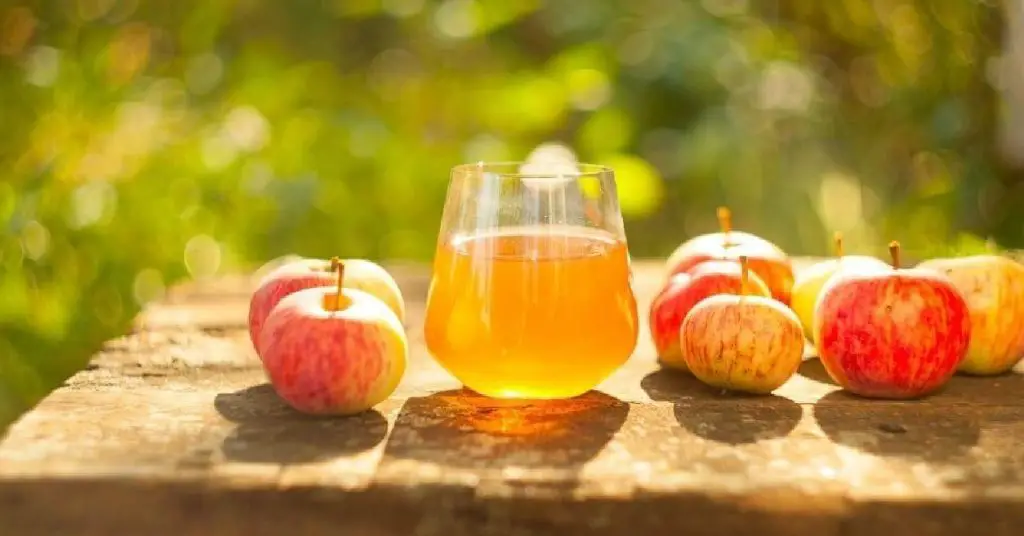Apple juice is a fluid that is the by-product of pressing apples. It contains all the nutrients of the apple, and has been given additional sweetness through adding more sugar to it. The most common type of apple juice comes from squeezing fresh oranges with apples.
Apple juice can also be created form blending other fruit juices such as grape or cranberry, or even using combinations with water and ice cubes mixed in. The resulting mixture has a consistency that ranges from a liquid to more solid than a liquid depending on its state when first blended together.

What Is Apple Juice?
The juice from the whole fruit is called fresh apple juice and is typically used in cooking. It could also be called apple juice concentrate. As a beverage, apple juice has been sold commercially in bottles or cans, sometimes marketed under the name of anything from ‘appleade’ to ‘nectar’, depending on the recipe used or where it was packaged.
In most supermarkets, the term ‘apple juice’ is usually used for a variety of drinks made by blending frozen (usually unsweetened) concentrate with additional water and/or other liquids.
What Is Vegan?
According to the Vegan Society, “Veganism is a way of living which seeks to exclude, as far as is possible and practicable, all forms of exploitation and cruelty to animals. It implies responsibility towards all creatures and for the environment. It includes special attention to our relationships with our planet and its natural resources.”
Veganism has been gaining popularity in recent years. About 1% of people in Britain are vegans but another 5% say they are ‘mostly vegan’ or ‘almost vegan’.
Is Apple Juice Vegan?
The Vegan Society outlines five points to consider when considering whether something is vegan:
1. Does the product originate from an animal (including eggs and dairy products)?
2. Are any of the ingredients derived from animals?
3. Does the product contain traces of animal fat, animal protein or animal by-products?
4. Has it been processed using techniques that involve harm or pain to animals or their body parts?
5. Is the product free from contaminants arising directly or indirectly from animal products?
By considering these, we can determine whether Apple juice is vegan:
1. Does the product originate from an animal (including eggs and dairy products)?
Apple Juice originates from apples that have been pressed. Although they are alive, they are pressed to extract their juice to create apple juice. No animals are involved in this process.
2. Are any of the ingredients derived from animals?
Apple Juice is made mainly with apple, which is famously vegan friendly. They also contain other fruits such as oranges, which are not.
3. Does the product contain traces of animal fat, animal protein or animal by-products?
Apple Juice has almost no traces of fat because they are made with the whole apple. The only trace of animal protein is tracing amounts of the skins (fiber) and seeds.
4. Has it been processed using techniques that involve harm or pain to animals or their body parts?
Apple Juice is made using a press, which is a process that does not involve harm or pain to animals.
5. Is the product free from contaminants arising directly or indirectly from animal products?
Apple Juice is free from all the ingredients in points 1-4 that are borne, produced, grown, modified, manufactured and distributed by humans.
Can Vegans Drink Apple Juice?
Although it is true that there are no traces of animal fat, animal protein or by-products in apple juice and it can be vegan, vegans should avoid all processed products such as pre-bottled juices because they may contain other ingredients which are not vegan. To ensure apples are always vegan, consider making fresh apple cider yourself.
Conclusion
Although Apple Juice is vegan and is among the most popular types of juice, it should always be avoided by vegans because it is a processed beverage. Fresh pressed juices are not processed.
Fruit juices are healthy alternatives to fizzy drinks, which can contain high levels of sugar and sodium. Fruit juices contain vitamins and minerals such as vitamin C, magnesium and potassium that help strengthen your immune system and promote good health. Consuming too much apple juice may cause diarrhea or constipation in some people if you’re sensitive to fructose.
